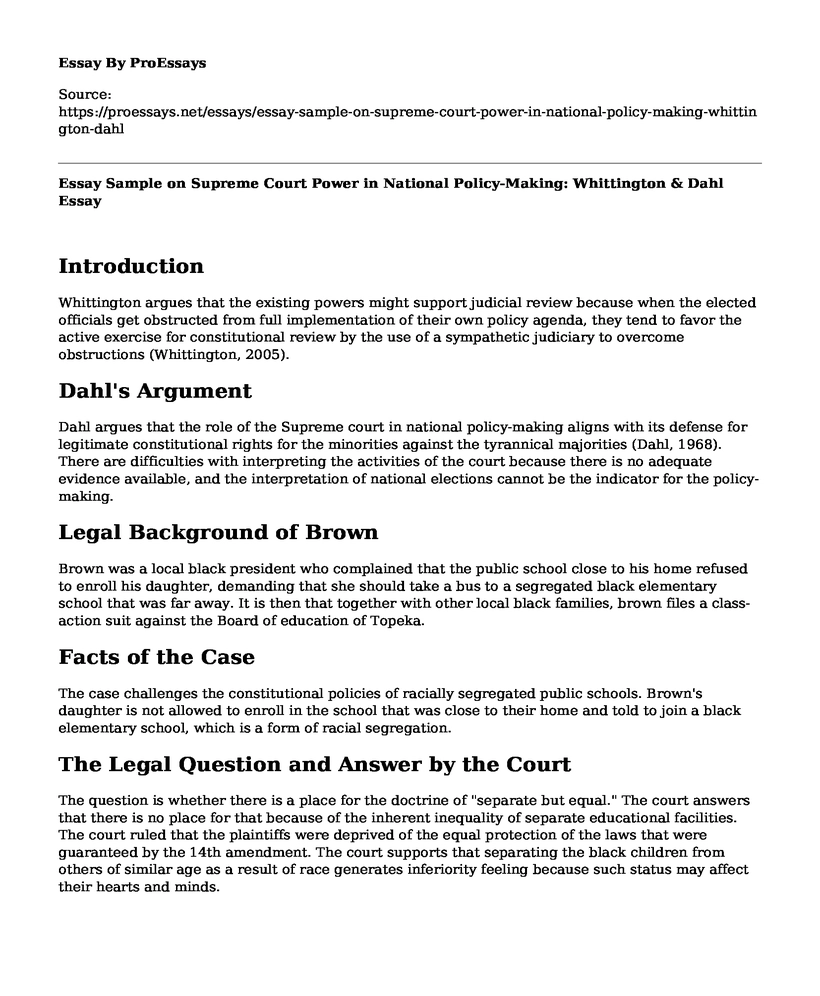Introduction
Whittington argues that the existing powers might support judicial review because when the elected officials get obstructed from full implementation of their own policy agenda, they tend to favor the active exercise for constitutional review by the use of a sympathetic judiciary to overcome obstructions (Whittington, 2005).
Dahl's Argument
Dahl argues that the role of the Supreme court in national policy-making aligns with its defense for legitimate constitutional rights for the minorities against the tyrannical majorities (Dahl, 1968). There are difficulties with interpreting the activities of the court because there is no adequate evidence available, and the interpretation of national elections cannot be the indicator for the policy-making.
Legal Background of Brown
Brown was a local black president who complained that the public school close to his home refused to enroll his daughter, demanding that she should take a bus to a segregated black elementary school that was far away. It is then that together with other local black families, brown files a class-action suit against the Board of education of Topeka.
Facts of the Case
The case challenges the constitutional policies of racially segregated public schools. Brown's daughter is not allowed to enroll in the school that was close to their home and told to join a black elementary school, which is a form of racial segregation.
The Legal Question and Answer by the Court
The question is whether there is a place for the doctrine of "separate but equal." The court answers that there is no place for that because of the inherent inequality of separate educational facilities. The court ruled that the plaintiffs were deprived of the equal protection of the laws that were guaranteed by the 14th amendment. The court supports that separating the black children from others of similar age as a result of race generates inferiority feeling because such status may affect their hearts and minds.
Reasoning to Support the Court's Decision
The court reasons concerning the fate of the black child in schools where there is segregation of these children on the basis of the race despite the equality of other physical facilities and tangible factors. These children are denied a fundamental right of access to a quality education because of segregation in the schools while everybody deserves equal educational opportunities. Separating the children affects their heart and mind in ways that it cannot be undone, making the education board interfere with their learning.
Separate Opinions
During the first verdict in the district court for Kansas, the three-judge panel was against the Browns claiming that racial segregation was not a violation of the 14th amendment for the Equal Protection Clause if there was equality of the facilities in question. The district court was in support of the legal doctrine of "separate but equal" that made the plaintiff seek justice for their children from the Supreme Court that listened.
How the Decision Fits with other Cases
The decision was crucial in seeking justice for other institutions that allow racial segregation that make the black community be known to be inherently inferior and form psychology injury to their minds. Institutions should understand that it is against the rights of members to discriminate against the basis of race. The institutions would be violating the fourteenth amendment by discriminating against the blacks.
References
Dahl, R. A. (1968). The Supreme Court's Role in National Policymaking. The Federal Judicial System, 358-363.
Whittington, K. E. (2005). "Interpose your friendly hand": Political supports for the exercise of judicial review by the United States Supreme Court. American political science review, 99(4), 583-596.
Cite this page
Essay Sample on Supreme Court Power in National Policy-Making: Whittington & Dahl. (2023, Apr 18). Retrieved from https://proessays.net/essays/essay-sample-on-supreme-court-power-in-national-policy-making-whittington-dahl
If you are the original author of this essay and no longer wish to have it published on the ProEssays website, please click below to request its removal:
- Policing Strategies in Hot Spot Regions - Literature Review Example
- Who Will Graduate? Disruption of High School Education by Arrest and Court Involvement
- Book Analysis Essay on Crime, Punishment and Mental Illness
- Paper Example on Stigmatization of Jail Victims: 5-Year Evaluation Study
- Correctional Institutions: Challenges in Managing Staff Members - Essay Sample
- Essay Example on Conservatism: Ideology Behind Preserving Human & Social Rights
- Mohammed Ali: A Sensational Boxer & Active Civil Rights Participant - Essay Sample







